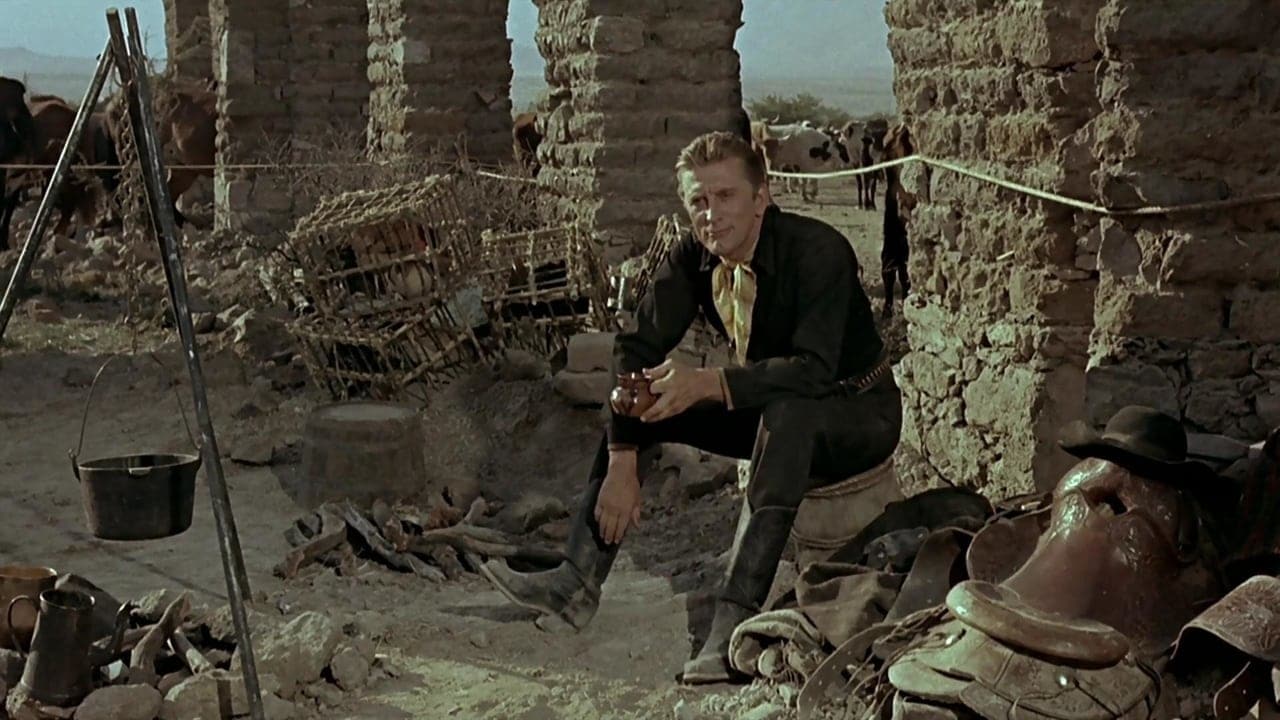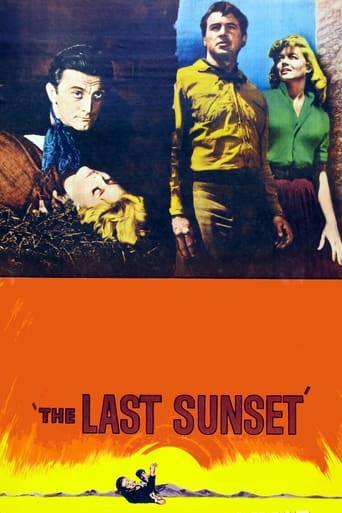

As perversely fascinating a Freudian western as "Johnny Guitar" or "Duel in the Sun," Robert Aldrich's "The Last Sunset" deserves to be a lot better known than it is. Special mention to James Westmoreland (an actor I was completely unfamiliar with) as The Julesburg Kid. He's terrific (and crazy hot!). Puzzled as to why he didn't become a star--or at least enjoy steady employment in movies or television during the 1960's and beyond. Was amused thinking of Rock Hudson and Dorothy Malone discussing their experiences working with Douglas Sirk during their lunch breaks.
... View MoreThere are so many subplots in this large-scale Western that with a little finagling here and there it might have been set in Omsk in 1841.Let me see. Proud former Confederate veteran John Breckenridge (Cotten) is now a drunk who owns a vast herd of cattle in Mexico and is married to his staunchly supportive wife (Malone). A criminal on the lam (Douglas) shows up at the hacienda. He's safe from the law in Mexico and he once had a fling with Malone years ago and still is interested in her, though she cares nothing now for him. Malone has a teen aged daughter (Lynley) who develops an adolescent crush on the charming and poetic Douglas. Trouble arrives -- if it hasn't already -- in the form of a Texas sheriff (Hudson) with a warrant for Douglas. The warrant can't be served in Mexico.The more general problem facing this disparate group is getting the herd across Mexico and into the town of Crazy Horse, Texas, where it can be sold. It's a BIG herd too, don't kid yourself. We see every head of cattle. But where to find the hands to herd the cattle? Malone and Lynley will be along, of course, and Douglas and Hudson both sign on but that's not enough. Cotten hires a trio of local muchachos who always seem to be singing at the camp fire or crossing themselves solemnly during moments of suspense. Three other raggedy Americans show up and volunteer but we know at once they can't be trusted because one is Jack Elam, whose eyes look in different directions like a chameleon's, and another is the nasty-faced Neville Brand, who has never played anything but a treacherous scalawag. There's a third guy but he's an oily cholo with a toothy smile and his eyes are always glued to the women.The drive begins, but it's so full of confrontations and intrigues that it would take too long to explain. It's full of action but some of the incidents hardly seem related to one another and the motivations are often as murky as the river that hides the quicksand that engulfs Hudson's dumb horse. For instance, I don't know why Douglas's devotion to Malone suddenly switches to her daughter, Lynley, who is only fifteen. Okay, Lynley has always been short-haired and dressed in sloppy work clothes until she shows up in a dress. But we've been here before and anybody with half an eye could have seen immediately that Lynley, whatever she had on, if anything, was as succulent as an overripe peach.Here's another incident, and it's a real shocker. Lynley follows Douglas around, mooning over him like a faithful dog, until finally he's won over, presumably by her innocence as well as that warm red sensuality. He tries to convince her that, after all, she should find another man because he's old enough to be her father. She's unyielding in her attraction to Douglas's animal magnetism and the dimple in his chin. So they do it in the woods. Here's the shocker. You remember when he said he was old enough to be her father? Well, as Malone informs him, he really IS her father -- and he's been doing her! This is a serious business. You can throw out all his other crimes -- the thievery, the murders, the betrayals, the grand theft auto. This is incest we're talking about. It's a universal taboo. Of the roughly 4,000 cultures we know something about, none of them allowed for marriage or intercourse within the family, with a handful of exceptions (eg., the royal Inca, the royal Hawaiians -- the family not the hotel -- and the ancient Pharaohs). Cousins are usually okay, but not anybody in the nuclear family. Douglas's violation of the taboo is handled lightly. The word "incest" is never mentioned. When he learns that he has just balled his daughter, Douglas looks stricken, but only because it means he can't marry Lynley. It's treated as a strictly legal matter of marriage.For all the money that must have gone into this production, it all comes out as rather slapdash. The three raggedy Americans are only there to provide an action sequence in which they are killed. No cowboy ever wore anything like Douglas's color-coordinate outfit. A black hat, black form-fitted shirt, black gun belt, black leotards, and glossy black boots by Gucci Pucci -- all accessorized by a canary yellow neckerchief. He's the same color as a bumblebee and a bicycle I once owned. His hair is never less than exquisitely trimmed and gelled by the studio barber.I'm going to run out of space so let me just add that Rock Hudson's role as the grim avenger is dull, and that Cotten, as the Confederate officer Breckenridge, is not the same character as John Cabell Breckenridge, the Confederate general from Kentucky who fought in the Battle of New Market, of which you may see a facsimile in "the little boys' charge" in John Ford's "The Horse Soldiers."
... View MoreThe Last Sunset (1961)Wow, what a cast for a Robert Aldrich movie--Joseph Cotten, Rock Hudson, and Kirk Douglas. And the themes in this big Western are big ones, from Civil War loyalty years after the fact to love and cattle ranching. There are shootouts and rivalries, there is a good guy and a bad guy and a confusing between the two, and there is the endless feeling of having to move on, on and on, like the cattle themselves.This is pretty late for a Western, which is to say it's late for an original Western. And so the themes here are either well worn or worn out. What keeps it going is some good acting, some pretty scenery (like the night stuff, especially), and maybe a elegiac sense, nothing poetic but relaxed and appreciative. But there is filler, some sentimental stuff, some girl stuff where the guys ogle the girls, some Mexican stereotypes, and a gratuitous fistfight or two (Rock Hudson and Kirk Douglas really rolling around and duking it out). So as much as there are characters you sympathize with, and a lifestyle out on the open desert, it's sometimes slow going. But then, if it's not slow, it's filled with action, though sometimes mindless action.The title? Maybe a nod to the end of an era. The next big Westerns in the 1960s were the great Italian ones, like "The Good, The Bad, and The Ugly," where the archetypes become references, something to exaggerate and make more important than the plot. In "The Last Sunset" there is no self-awareness, no acknowledgement that the themes here are clichés, right down to the last duel past the tracks. It might have been daring in 1938, but for 1961 it's just well made familiarity.
... View More"The Last Sunset" (1961) rates in the top 30-40% among Hollywood's Westerns. The No.1 reason is Kirk Douglas' altogether credible, nuanced acting as the villain you both love to hate and almost love. Douglas' Brendan 'Bren' O'Malley is a man who practically makes black grey. This is all the more surprising when one catches the ongoing, disturbing incestuous subtext between the O'Malley character and his daughter/lover. The No.2 reason that makes "The Last Sunset" a good film is the sulfurous Dorothy Malone. Her powerful, on screen sexuality is thoroughly charismatic and satisfying – without the need to show off feminine flesh or unduly flirt. The film's directing is surprisingly mundane. Joseph Cotten's character of John Breckinbridge shows that Cotten at this stage in his career couldn't act his way out of the paper bag his bad booze comes in. While Rock Hudson is his usual big, lumpy self. He's a statue that talks and "no rock" -- to paraphrase both James Dean & Doris Day on this embarrassingly awful actor. In spite of the film's standard cattle drive story, ordinary setting, and almost ordinary story line – it rises above its limitations, carried there on the artful shoulders of two fine actors (K. Douglas and D. Malone); and, not forgetting, a use of photography that lingers just a satisfying moment too long on their disturbing, penetrating features.
... View More